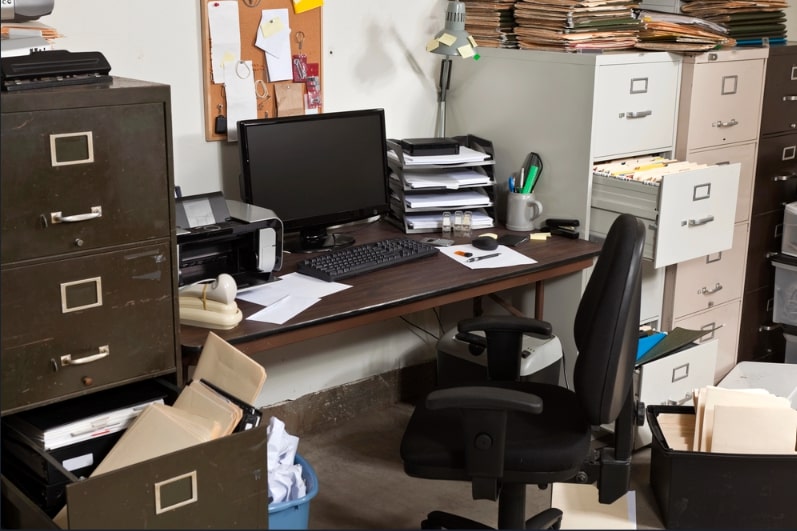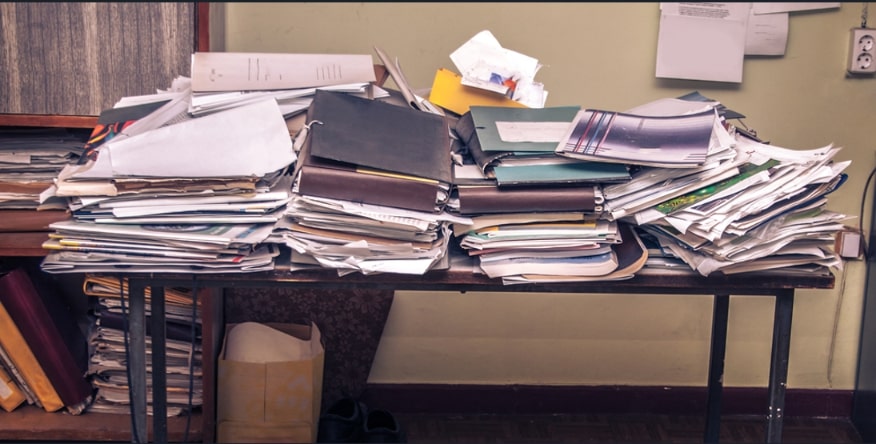Introduction: In this article – to help celebrate today being ‘Get Organized Day’ – Gena Philibert-Ortega gives tips for decluttering your genealogy collections. Gena is a genealogist and author of the book “From the Family Kitchen.”
There’s a holiday for everything! Did you know April 26 is Get Organized Day? Although the origin of this day is unclear, there’s no doubt that everyone – genealogists especially –could use a day set aside for organization.*
Countless online and in-print articles have been written with the goal of helping family historians organize their research, office space, computers, and mobile devices. One of the first steps to organizing or keeping organized is to make decisions about decluttering, including what to toss.

Photo credit: https://depositphotos.com/home.html
Tossing genealogy? Don’t worry, I’m not suggesting that you should throw away your genealogy. It’s really much more complex than that. Genealogy is a pursuit that requires gathering items. In the past that was mostly paper but today it means paper and digital files.
If we just concentrate on those paper items, it’s likely you have in your collection items that are invaluable, expensive, or heirlooms. But as with anything there are items you can evaluate and then either pass on or throw away, thus only keeping the items that you want to hold onto and preserve.
Making the Decision
In thinking about your research, what can be tossed or passed on? This is a vast topic so for now, let’s start with the most obvious, especially for those of us who have been researching genealogy for decades or who have inherited genealogy: all that paper!
Paper and genealogy have a long history and those items collected by the genealogist include:
- Photocopies/Home printer copies
- Records
- Handouts
- Syllabi
- Newspaper clippings
- Newsletters
- Magazines
- Correspondence (historical and the correspondence we have received)
Some questions to consider as you decide what to do with all that paper:
- Did I pay for that item (such as a record or certificate)
- Is the item available online?
- Is it outdated?
- Will I need it again?
- Is it an heirloom or heirloom quality?
- Is it a document to keep for later research?
- Do I need the actual item, or can I digitize it and just keep a digitized copy?
Obviously, you don’t want to throw away vital records you ordered or any document or certificate you paid for. Most likely those are items you can’t replace easily, and they will be needed. Those items should be filed away and maybe preserved if they are older and fragile.
But what about that handout from the genealogy conference you attended five years ago? Should you keep that? Is the information still relevant? In most cases, it is not. I recently found a syllabus from a conference I attended back in the early 2000s. I was going to keep it but when I looked through it and realized that most of the software and websites were obsolete, I realized it was better off in the recycle bin.
For me, I personally keep items that I paid for (unless not needed or online) but I recycle paper items like presentation handouts and syllabi, photocopies of the U.S. Census (those are online and easy to save to your computer or online tree), and magazines and newsletters (digitize what you need and either pass on or recycle). I digitize items like newspaper clippings which are going to deteriorate over time.

Photo credit: https://depositphotos.com/home.html
I Don’t Have Room!
What do you do if you have started decluttering but you realize you still don’t have room for what you want to keep? Maybe the amount of certificates, documents, records, etc., outnumber the drawers and square footage you have or that you will soon have.
Consider what could be digitized. If you digitize items, you can save them to your computer, share them with family, or upload to an online tree. This would help preserve the items and ensure they survive you.
Is there another family historian in your family that would welcome those items? This might be a way to “share the wealth.” Maybe they would welcome those items. If you find someone, make sure you are passing on what is needed and not just giving them an organization project.
If you have a large collection of items that date back generations, it’s possible an archive might be interested. If the items span a large time period, are about a family in a specific area, or tied to an organization (like a university), that might be a collection worthy of study by researchers and would best be preserved by a library, archive, or museum. Once again, they don’t want your organization project so make sure it is organized, and you inventory what you have before approaching a repository. They or their website will explain the process for donating and what is accepted.
Organizing Genealogy Is Vital
I often think back to my son asking me how he is supposed to know what’s important to keep when I die. It’s a great question, and some of what I have is not important to keep – but when there is so much “stuff,” your family will quickly lose interest and motivation to figure out what should be kept versus what can be tossed.
Do yourself and your family a favor and start organizing little by little, including tossing or passing on the paper items that are not an important part of your family history collection.
* “Get Organized Day April 26, 2004.” National Today (https://nationaltoday.com/get-organized-day/: accessed 23 April 2024).
Explore over 330 years of newspapers and historical records in GenealogyBank. Discover your family story! Start a 7-Day Free Trial
Note on the header image: piles of paper needing organization. Credit: https://depositphotos.com/home.html

I struggle with organization but your words and suggestions have encouraged me to organize!
Thank you!
Thank you, Susan! It’s a process. It takes time, so keep that in mind when you feel frustrated. In the end, it will be worth it.